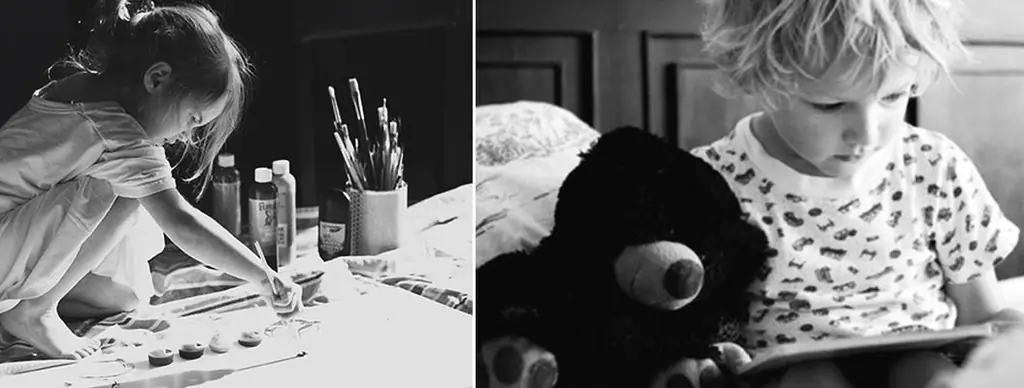- Author Adrian Jeff [email protected].
- Public 2024-01-15 12:22.
- Last modified 2025-01-24 14:09.

Blackmail, hysteria, protest … How to defeat childish manipulations?
Each child is born with a certain set of psychological properties - a vector, and more often than not one. The vector determines the way of the child's perception of the world, his desires, abilities, priorities. It is these desires that he tries to satisfy in any way he can. And so far he does not know how, except for the most primitive - to declare his WANT …
- I have no strength, and if you buy me ice cream, I'll go quickly.
***
- Mom, buy me this spinner.
- You already have one.
“If you don’t buy me, I won’t go to school. There, everyone already has such.
***
- Play me a cartoon.
- It's time to go to bed, honey.
- I won't be able to sleep if I don't watch the cartoon. He calms me down. Otherwise I will come to you all night.
Give in?
Children's manipulations are not uncommon. Modern children grow up faster than their parents have time to realize it. If at three years old an attempt to lure a candy out of mom looks cute, then blackmail at ten and outright provocations at twelve are already perceived with caution.
The easiest way is to dismiss another manipulation, ignore, or even punish for bad behavior. But what to do if all these measures lead only to the fact that the manipulator "improves his qualifications" - finds and uses the weak points of adults, knows when and what needs to be given to the irritated parent in order to get what he wants.
Then questions arise, many questions:
- How to respond correctly to children's manipulations?
- What does the child really want?
- Can a child be weaned from manipulation?
The answers lie in the peculiarities of the child's psyche and the principles of its development.
Little manipulators - who are they?
Each child is born with a certain set of psychological properties - a vector, and more often than not one. The vector determines the way of the child's perception of the world, his desires, abilities, priorities. It is these desires that he tries to satisfy in any way he can. And so far he does not know how, except for the most primitive - to declare his WANT.
Yes, a small child is one big GIVE. Food, water, heat … Attention, emotions, impressions, toys … And if they don't give what they want to GIVE, they start looking for another way to satisfy all the same GIVE.
By understanding the nature of the manipulator, one can clearly see his real desires, which he is so desperately trying to satisfy.
Sometimes a child, provoking another scandal or extorting a hundredth car in a store, actually wants something completely different. And the key to solving the problem is in understanding the unconscious aspirations of a growing personality, which are revealed at the training of Yuri Burlan "System-Vector Psychology".
Let's look at some examples.

Child with skin vector. His value system is based on striving for excellence - he wants to always and in everything to be the first, the leader. It is important for him to feel faster, smarter, more cunning. It is important to get a reward in whatever you do, be it money, shopping, travel or entertainment. Time is a resource for him, and he does not intend to waste it in vain. He will not do what he does not see a benefit for himself.
When he gropes for such an easy opportunity to get what he wants, how to play on parental nerves and feelings, he naturally adopts this method of "getting" new toys, sweets, new items or gadgets.
Kid with visual vector. He lives with emotions. Sociable, sensitive, with wild imagination and expressive facial expressions, he is ready to talk all day. For him, the exchange of emotions and impressions is his favorite pastime. He loves being the center of attention and admiration.
It is visual children who are able to throw a tantrum in a store, cry bitterly when parting in the morning in kindergarten, or scream in the street. Any means of getting attention and getting what you want through pity or emotional blackmail will be used - as a primitive way to satisfy inner desires.
What to do? Step-by-step instruction:
Understand what kind of child is in front of you, how he thinks, what he really wants.
Understanding what is happening becomes the foundation on which effective child rearing is built. Systemic thinking, which is formed in the course of the training "System-vector psychology", makes absolutely transparent any actions of your child, as you realize the true motives of his behavior.
You, as a parent, move from the category of an observer who is not able to help, redirect, orient the child, to the category of an included mentor, even rather a close friend, since now you know more than the child, you understand him better than he does, you literally see right through it.
Do not give in to manipulation, make it clear that this does not work with you.
Baby manipulation is a primitive way to get what you want. When you exclude the possibility of getting something in such a way, you force thereby to look for another way, to strain your forces.
The fact is that innate desires will not go anywhere, they will still force the child to find an opportunity to satisfy them. The leatherworker cannot stop striving to "obtain" all kinds of benefits for himself, and the viewer is not able to give up emotional impressions. It is in your power to help your child channel his energy into development.

Provide a lasting sense of security and safety.
This is the base, the base of the foundations, without which all other measures are just a castle in the sand. Only on the foundation of security does the child get the opportunity to develop, to try other, more complex, interesting ways of realizing his own desires.
The child is psychologically closely related to the mother. Mom is perceived by him as the only guarantor of survival. The smaller the child, the stronger this addiction. The confidence that the mother is near, which will protect against any threats, gives the child a sense of psychological comfort, security and safety. It is this that is subsequently associated with the feeling of a happy childhood.
Only a mother, who herself is in a state of internal psychological balance, can fully ensure the child's security and safety.
Any not very good her condition, aggression or indifference towards the child is perceived by him as a threat to his survival. At this moment, there is a loss of a sense of security and safety, and as a result - inhibition of the child's development, which can be expressed in his problematic behavior and other deviations.
Build an emotional connection.
A trusting relationship with a child is formed through strengthening the emotional bond between parent and child. You can only share your feelings with someone who understands you, who you can trust, who also has feelings.
The very deep understanding of the child's inner states gives him a feeling of acceptance. He feels that he is accepted as he is, without judgment, without evaluation or probation, just being accepted as good without conditions.
Literature is a powerful tool for strengthening emotional connection. Classical works that evoke compassion for the heroes make it possible to live together an emotional outburst, cry over the difficult fate of the characters, share their hardships and sufferings. Read them together aloud, with passion, and you will see how your child will change.
With the help of the right literature, it turns out to shift the focus of the child's attention from his own feelings to the feelings of others, to bring out the entire emotional potential of the visual vector, to give the correct development and guideline for the full realization of the sensory sphere.
Build your interaction with the child within the framework of his system of values.
Guided by an understanding of the psychological properties of a child, we get the opportunity to show a more interesting option for realizing our potential, rather than provocation and manipulation. It's yesterday … Frivolous children's pranks …
Do you want to be the coolest? New jeans? Smartphone? Finish the school year perfectly. Or get gold in volleyball competitions. Organize the collection of waste paper.
Do you feel like screaming? Throw a tantrum in the central square? Go ahead! I'll wait on the bench over there. But if you change your mind, we’ll do a home theater this weekend. Who do you want to play - Snow White or Cinderella?
The visual desire for the audience finds an excellent realization in the theater group, dance studio, vocal lessons. Imaginative thinking is perfectly embodied in paintings in the classroom at an art school, and a big heart and the ability to compassion - in bird feeders, helping homeless animals and, of course, people in need of help.

Skin desire for victory can be embodied in sports, logical thinking - in an interest in mathematics, innovation - in engineering thought, the desire to command - in organizational activity.
Attempts to manipulate or blackmail parents are not a manifestation of a bad character or a desire to annoy adults, it is a desperate attempt to realize the psychological potential given by nature.
Give the child the opportunity to feel the taste of realization of a higher level than this primitive, and he will not want to return to extortion anymore. He won't have to do it. After all, no provocation will bring him such pleasure as winning a real competition or standing ovation from a full audience.
Real pleasure is possible only from real life. They learn this very quickly. One has only to set the vector.






